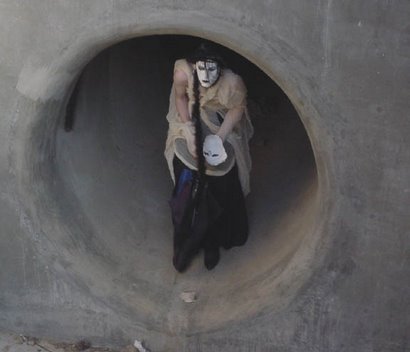HEY!
* * *
* * *
A journal to which I will no longer submit.
Full disclosure: I was rejected (form letter) by Absent once, so read into that whatever you will. But I've gotten tons of rejections from places that I still greatly respect and submit to regularly.
A portion of their submission guidelines copied-and-pasted directly from their website:
A special note from Simon, grouchy reader of the slushpile: starting with issue three, unsolicited poetry submissions may not require special formatting. In particular, the only formatting I will process are italics (which you may mark in plain text as *italics*) and the meter-continuation indent:
Radiology has revealed
Radiology has revealed there are no fractures in your feet.
There are many reasons for this. My own personal aesthetics have been moving away from the notion that five inches of whitespace is any more or less meaningful than three inches, or fifteen spacebar presses, or twelve carriage returns. I believe more and more that poetry broadly construed is a product of the voice, not the eye.
It is also the case that HTML and CSS deal very, truly poorly with the kind of demands made by complex arrangements. Browser-to-browser treatment of the same code varies wildly once you move beyond the simple. For more on this issue, see John Tranter's remarks on fussy indents. Note that we have functional cross-platform code, affectionally called .whit, to deal with long lines and unlike Jacket are happy to print them.
You are welcome to send hate mail regarding these demands; PDF format preferred. None of these demands applies to solicited work; we will work with you to do the best we can.
This strikes me as lazy / offensive / ignorant on too many levels to fully comprehend at the moment. Initially, my gut reaction was “how can an editor actually reject a poem just because s/he utilizes whitespace, carriage returns, etc in her/his poem?” But the more I thought about it, the more I realized that almost every journal probably does this in some regard. I mean, that’s the whole foundation for the standard rejection that says “thanks for sending these, but they’re not a fit with X Journal.” So while the upfront statement of what the editor finds valueless seems foolish, it’s a standard practice. (Seriously, what’s wrong with poetry looking pleasing to the eye? Isn’t that why most prose poems are justified in their formatting, not left with the ragged right edge? That practice is pretty much standard from my experience.) Or there wouldn’t be the need for so many different journals that cater to different types of poetry.
The problem that continually plagues me is supposedly secondary reason as to why poems that utilize special formatting are rejected: they’re just too darn hard to format! First off, I can probably find twenty or thirty good online journals in an hour that have formatted tremendously difficult poems with top-notch results. So this isn’t an endemic problem in the online poetry journal community. Second, if I were running a poetry journal, I would want to take the necessary steps to ensure that I could publish whatever came my way (let’s limit it to text and standard photos). I would hate to reject a poem from [insert favorite poet here] b/c I wasn’t willing to indent some lines or add a little whitespace here and there.
The special treatment of solicitors didn't really register to me: solicitation is regular part of the po-biz, and it's a rare day indeed when all poets are treated on equal footing. Plus, if I requested work from [name of Mr(s). Universe of Poetry], I'd do everything possible to make their work as snazzy as possible.
I’m sure that I haven’t fully articulated my qualms yet, but basing an acceptance policy on formatting inabilities / inadequacies doesn’t seem like a smart editorial decision. Either reject it because it doesn’t fit your aesthetics or don’t reject it at all.
* * *
Some publications of mine over the summer:
Saint Elizabeth’s Street: 4 poems
elimae: [For you, melanoma is not an option.]
Forthcoming in Prick of the Spindle: [White-gowned seraph, is
The last two publications feature newly minted poems from Psalms to No One, which is complete with 50 total poems. It needs a good home alongside In Order, A Broken Prayer, which is the remnant of Palsy Aria—I guess P.A. into a chapbook composed mainly of dream sequence poems b/c the collection seems to work better. Palsy Aria, the poem itself, was remade in Psalms to No One.
In a side note, all but about 2 poems were composed w/o the help of online poetry boards. One was posted for a general reaction and another to help w/ a translation issue. We’ll see how this goes. For someone with no formal training in poetry, it’s a big step.
* * *
Welcome back to sobriety and sense, Daya!
* * *
Hmm, I think that’s about it. I’ll try to be regular, but I need to rely on you, the readers, to keep me honest. I can’t speak for B. She’s her own woman.
-j


No comments:
Post a Comment